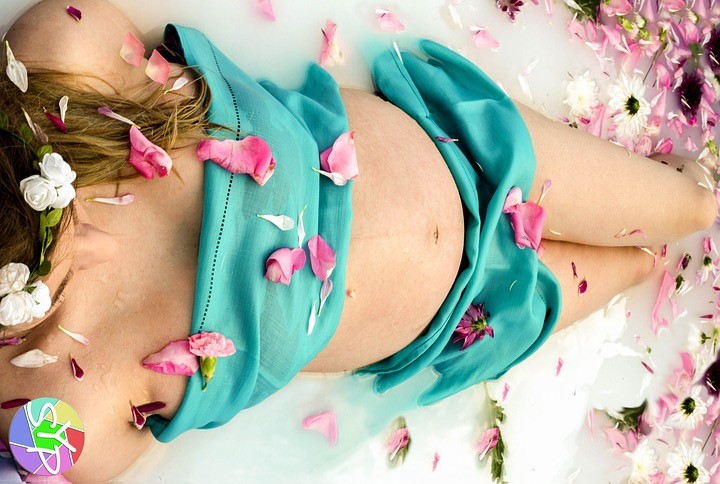
Body + Mind is reader-supported. We may earn an affiliate commission when you buy through some of the links on our site.
After childbirth, you may experience fatigue and mood swings, along with a whole bunch of other fun symptoms. Thyroid issues after pregnancy, or postpartum thyroiditis, can cause added stress and discomfort to new mothers.
The condition usually sets in during the first year after you give birth, miscarry or induce abortion. Researchers consider it a variety of Hashimoto’s thyroiditis or autoimmune thyroiditis.
If you’ve been pregnant in the past, you’re at risk for developing postpartum thyroiditis. About 7 percent of women will develop the condition, and your risk increases if you have additional thyroid markers or conditions.
A significant portion of women who suffer from Type 1 diabetes will also have postpartum thyroiditis, and more who have high anti-peroxidase (anti-TPO) antibodies will experience postpartum thyroiditis. Do you have a personal experience or family history with thyroid disorders? Do you have chronic viral hepatitis? These experiences and histories put you at risk for postpartum thyroiditis.
Typically, the most common bout with postpartum thyroiditis is slight hypothyroidism that sets in eight weeks to six months after giving birth. Hypothyroidism resolves as the thyroid normalizes. Mild hyperthyroidism may set in as the second most common course four months after childbirth, and the third most common course involves a shuffle from mild hyperthyroidism to hypothyroidism until the thyroid normalizes.
Even if your thyroid normalizes, you may later develop a chronic thyroid condition or get a goiter — that’s a larger-than-normal thyroid gland. Experience increases your risk.
Mileage may vary on the postpartum thyroiditis symptoms you experience during the hypothyroid and hyperthyroid phases, including, but not limited to:
The hyperthyroid phase’s symptoms usually mean enduring milder forms of overall hyperthyroidism. Thyroid issues after pregnancy generally shows themselves through muscle weakness, mood swings, quick heartbeat, heart palpitations, anxiety, weight loss, tremor and diarrhea.
The hypothyroid phase’s symptoms run the course of overall hypothyroidism. The same lovely handbasket can also include dry skin, sluggishness, trouble losing weight/weight gain, lowered body temperature, constipation and puffy face, eyes and hands.
A doctor conducts various blood tests before reaching a diagnosis of postpartum thyroiditis. The hyperthyroid phase typically shows a low thyroid-stimulating hormone (TSH), triiodothyronine (T3) and elevated thyroxine (T4). With hypothyroidism, TSH is high, and T3 and T4 vary from low-normal to low. Thyroid peroxidase (TPO) antibody levels likely show up high in most women who have postpartum thyroiditis, particularly in the hypothyroid stage. If the doctor does an ultrasound, you may see an enlarged thyroid gland.
In addition to postpartum thyroiditis, post-pregnancy issues can also lead to Graves’ disease — which leads to hyperthyroidism. Postpartum hyperthyroidism is usually the more likely reason for hyperthyroidism, but the doctor will rule out possible Graves’ disease. Distinguishing factors of the latter include worse symptoms, more noticeable thyroid growth and eye issues. Sometimes, doctors use a test for non-breastfeeding mothers called a radioiodine uptake to tell the difference.
You typically don’t need treatment if you have postpartum thyroiditis during the hypothyroid or hyperthyroid phases. Mild symptoms and the condition resolve on their own, usually within a few months to a year after the baby’s birth.
If hyperthyroidism symptoms prove uncomfortable, the doctor prescribes a beta-blocker like atenolol or propranolol. If you take these, your physician will advise you not to breastfeed. Antithyroid medication isn’t for hyperthyroid symptoms of postpartum thyroiditis.
For significant symptoms of postpartum thyroiditis, doctors conduct thyroid hormone replacement. You typically use the medicine for six months to a year to clear up thyroid issues after pregnancy. You’ll get tested again to see if the condition vanished.
After postpartum thyroiditis runs its course, you should always make your doctor aware of this medical history if planning to get pregnant again. You have an increased likelihood of developing postpartum thyroiditis again, as well as a goiter or hypothyroidism in later years. So, get your thyroid checked annually, along with everything else!
Your email address will only be used to send you our newsletter, and at any time you may unsubscribe. For more information, see our Privacy Policy.